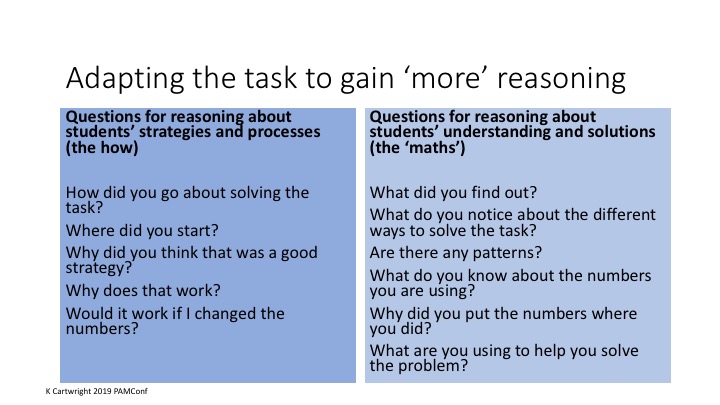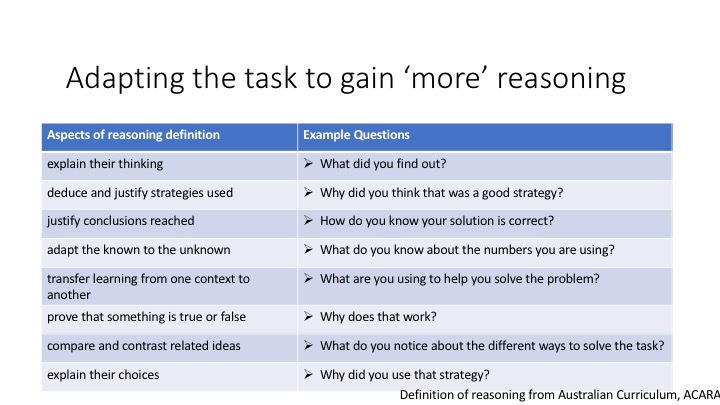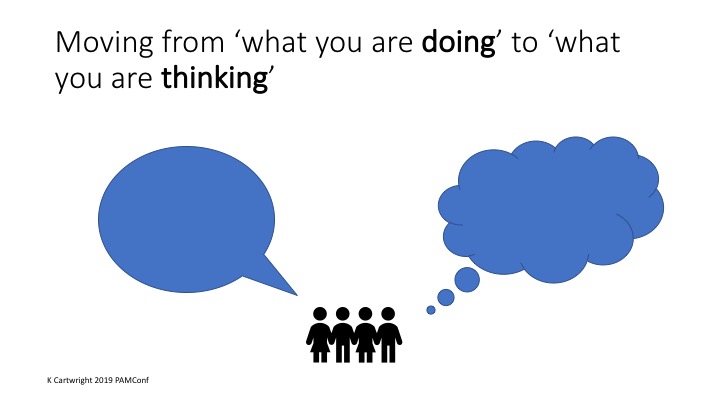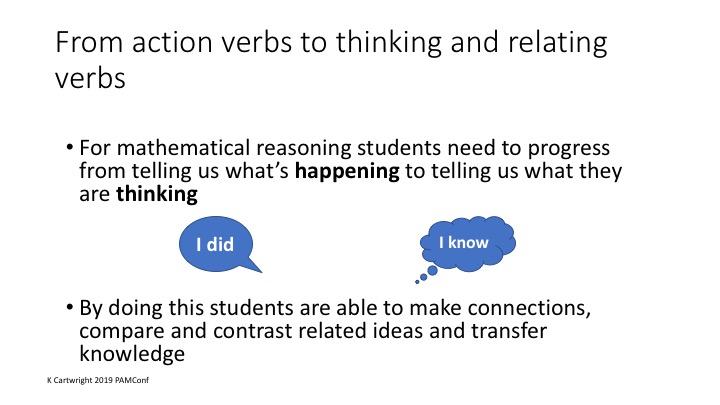How do we get students talking about their mathematical thinking? This is a common question that classroom teachers ponder when reflecting on mathematics lessons. Reasoning in mathematics is also a current theme within mathematics education research; proportional reasoning, mathematical reasoning, spatial reasoning, algebraic reasoning and numerical reasoning, just to name a few. Two previous conferences I have attended this year have also had a focus on students’ reasoning (you can read my reflections of the PAM K-8 conference and the MERGA42 conference).
“As many as fifty thousand questions are commonly asked by teachers in a year compared to ten questions asked by students.”
Watson and Young (1986), Discourse for learning in the classroom
For me, one of the most vital ways to elicit students’ mathematical reasoning is through questioning. It is not simply including or asking more questioning itself that is necessary, but specifically designed questions that help in drawing out students’ prior knowledge and encourage students to move beyond just explaining what they are doing.
“Coming up with the right question involves vigorously thinking through the problem, investigating it from various angles, turning closed questions into open-ended ones and prioritizing which are the most important questions to get at the heart of the matter.”
Katrina Schwartz, For Students, Why the Question is More Important Than the Answer
Why do we ask questions?
The NSW Mathematics K-10 syllabus states that students should “be confident, creative users and communicators of mathematics, able to investigate, represent and interpret situations in their personal and work lives and as active citizens.” This means that students should not only be able to answer questions, but be able to pose questions as well. Having the mathematical knowledge alone is not enough, students need to be able to wonder and question about the mathematics. When students can communicate and talk about what they know, that’s when they are truely proficient. Then the mathematics can be applied and explored for a variety of specific purposes. We pose questions to:
- gain insight
- confirm understanding
- extend thinking
- build on prior knowledge
- find gaps and misunderstandings
- develop shared sense making
We don’t ask questions to answer them ourselves
Hopefully, as classroom teachers, we don’t ask questions to answer them ourselves. We ask questions to provoke student thinking and promote student to student discourse where mathematical ideas are discussed. We may have anticipated certain solutions by students, but our in-the-moment decisions need to be based on student responses that may take us in different directions, not just where we planned to go!
Types of questions
To help guide us in the kinds of questions to ask, we need to think about what we want students to reason about. There is not list of ‘best’ questions, question-asking is a skill that needs to be developed.
- Answer seeking… ‘what is the answer?’
- Knowledge building… ‘can you add to what… said?’
- Knowledge proving… ‘does it always work?’
- Noticing/ Wondering… ‘I wonder when we might use this?’
I presented at the MANSW PAM K-8 conference earlier in the year and shared some questions I ask students in mathematics classrooms and how I’ve adapted them to gain ‘more’ reasoning. Often, it’s a simple change of the question stem, or thinking more about the learning intention and my expected outcomes to adapt the questions to meet the lesson’s purpose. Sometimes I want to ask questions about students’ processes and sometimes it’s about the mathematics itself. I also thought about how ACARA’s Australian Curriculum: Mathematics defines reasoning and what questions might look like align to that definition.
Another shift I’ve made is to clarify for students if I want to know what they are ‘doing’, or if I want to know what they are ‘thinking’. Below is the idea I’ve been playing with that I hope you can utilise in your own classroom. When students think about themselves communicating what they know, helping them understand whether it’s the act of doing (“what I did”) or thinking (“what I know”) can help. Then students can also use these question stems in their talk, with the aim of moving beyond “I just thought it”, or “my brain just did it.”
For further information and teaching resources regarding reasoning, I recommend checking out the teaching resources on the ReSolve Maths by Inquiry website. This link to the Assessing Reasoning: Year 3 exemplars will take you to where you can download all the reasoning resources. The overview and teachers’ guide PDFs are particularly useful and include their reasoning rubric that focuses on the three actions of reasoning: analysing, generalising, and justifying.
References and links
Mindshift article, For students, Why the question is more important than the answer
Watson, K., & Young, B. (1986). Discourse for learning in the classroom. Language Arts, 63(2), 126-133.
Way, J. (2008). Using questioning to stimulate mathematical thinking. Australian Primary Mathematics Classroom, 13(3), 22.
Questions, where would we be without them? TED talk Dan Rothstein https://www.youtube.com/watch?v=_JdczdsYBNA









